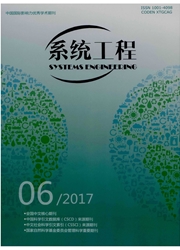

 中文摘要:
中文摘要:
在政府的排污控制政策下,对企业如何购买初始排污权和排污权期权,从而使自己的采购成本最小这一问题进行了研究。采用非线性规划模型,并利用Kuhn-Tucker条件分析了有约束条件时解的特征。研究发现:相对于无约束情形,有约束时企业的最优采购量明显下降;且有约束时,企业优先考虑购买初始配额,然后才决策是否购买期权和购买多少;在约束较紧期,企业的决策特征为只购买初始配额,而不买期权。在约束较为宽松时,企业在购买初始配额之外还会购买期权。以上应对措施避免了不确定因素带给企业的损失,同时又可以使企业减排。
 英文摘要:
英文摘要:
This paper studies how enterprises purchase the initial emission permits and real options so as to obtain their minimum purchasing cost faced by the constraint of the government's pollution control policies. This paper discusses the characteristics of the solution by using the non-linear programming Kuhn-Tucker condition. The result shows the optimal purchasing volumes dropped significantly faced by the constraint of the government's pollution control policies compared to the unconditional constraint. Enterprises with constraints give priority to purchase the initial emission permits, then the decide whether or not to purchase real options and buy how much. The decision feature of enterprises buys only the initial emission permits instead of buying real options with the tighter constraint. Enterprises will buy the initial emission per- mits and real options with the more relaxed constraint. The above measures avoid the loss of the enterprise because of the uncertain factors and also can make enterprises emission reduction.
 同期刊论文项目
同期刊论文项目
 同项目期刊论文
同项目期刊论文
 Study on Optimization of Collaborative Innovation Network Structures Based on Grey Property of Knowl
Study on Optimization of Collaborative Innovation Network Structures Based on Grey Property of Knowl Theimpact of network structure on innovation efficiency: An agent-based study inthe context of innov
Theimpact of network structure on innovation efficiency: An agent-based study inthe context of innov 期刊信息
期刊信息
